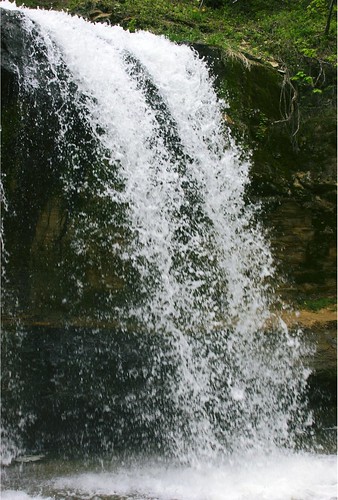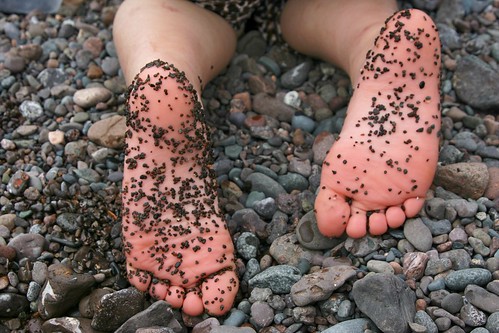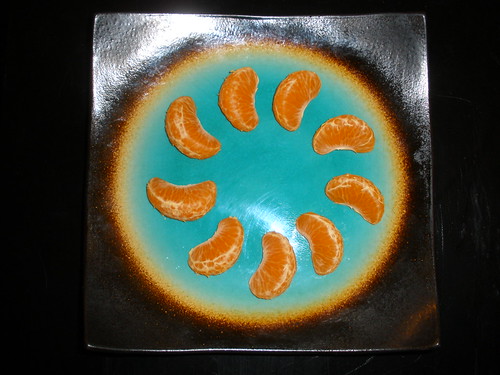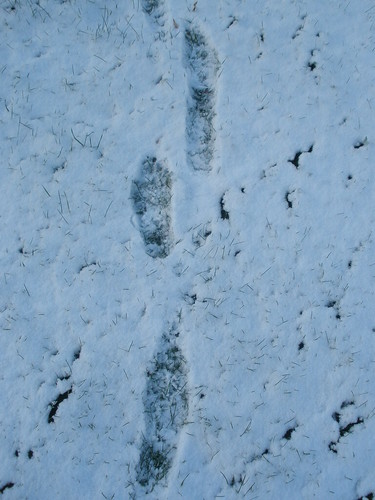Cascade Falls
Today's focus of the No Impact Week Experiment is using less water. According to the Experiment, 71 percent of Americans are trying to reduce their footprint on the earth. Of the 71 percent, 60 percent are trying to reduce the amount of water they consume.
There's a website where you can go calculate your individual water footprint. Your individual water footprint is equal to the water required to produce the goods and services consumed by you. The calculations are based on the water requirements per unit of product as in your country of residence.
Sophia's feet covered in pebbles
while she looks for rocks
by Cutface Creek on Lake Superior
After answering the questions, the website said that my total water footprint is equal to 1206 cubic meters per year. The components of my total water footprint are:
913 - Food
277 - Domestic
16 - Industrial
1206 - Total
So, how does that compare to other people in the U.S.? A study was done that looked at different nations' water footprints. The U.S. showed a water footprint at 2,803 cubic meters.
Some ideas for change from the No Impact Week Experiment and YES Magazine include:
Use Less Water When Washing Dishes
Fill the sink with hot, soapy water and let the dishes soak. Less water will be used because the food will be easier to remove. When using a dishwasher, make sure that it is run only when the entire dishwasher is full.
After eating, soak your plates
to reduce the amount of water you use.
Take Shorter Showers, Turn off the Water When Brushing Your Teeth
I remember going to Long Lake Conservation Camp when I was in sixth grade. These lessons (and more) were shared with the students. They're good reminders.
Olivia drinking water (she was learning about the difference
between the taste of tap water and ocean water
as part of her homeschool lesson).
Why is she drinking from a disposable paper cup?
These are used to make homemade popscicles
during the warmer months (they're made with
juice, yogurt, and/or fresh berries...and no chemicals or preservatives!)
Drink Water in Restaurants
Water is the least-processed of all drinks that you can order in a restaurant. Ideally, order tap water rather than bottled water.
There are additional suggestions, but ones that I don't envision using just from a time-saving perspective. For example, it was suggested that you could wash clothes by putting them in your bathtub and then stomping on them (like grapes). Here's a blog posting about someone who did it. Not sure if he and his family are still doing this, but he did try a variety of different ways to help lessen his impact on the environment.
That's the whole point of the week. To try new things this week that can lessen your impact on the environment. Equally important, is collecting ideas for trying things in the future.
Footprints in the Snow






4 comments:
There's a big difference in our water consumption. Did you just calculate what you use or what your whole family uses? I know Americans are meant to be extravagant, but that seems so much more. I'm wondering if I have underestimated, but even then I don't think it's by a factor of 4.
I did the water consumption based on what I personally use since each person in my family would have different answers.
I just checked out that study you referred to and see that your usage is below the global average and below the UK national average. I'm wondering if mine can really be as low as 322. I know beverages other than tea and coffee were not included, so I obviously drink more than 4 cups a day, and my hot drinks are in a large mug, so that will increase my footprint for drinks to more than 51 cubic metres a year. Doubling it will only account for 4 mugs of rooibos tea a day.
I was brought up to be fairly frugal, but my usage does seem exceptionally low so I will try to measure my usage of the various items more accurately over the next weeks.
P.S. It seems those calculations mean I use half as much water as the average Yemeni, which I don't think can be right.
Post a Comment